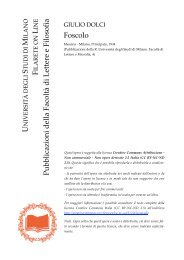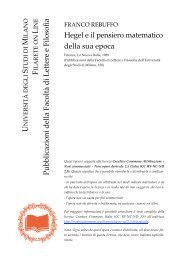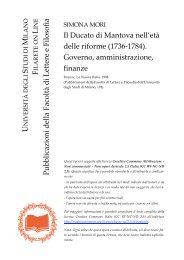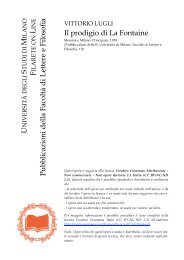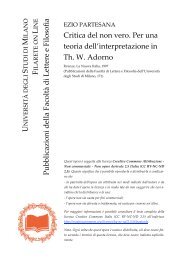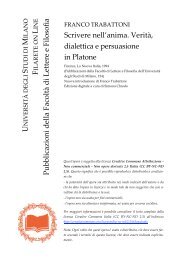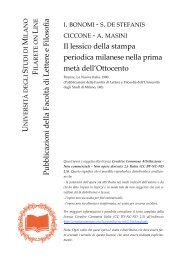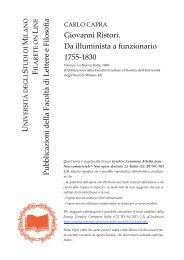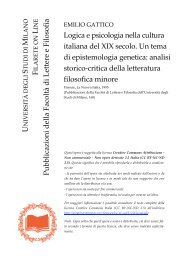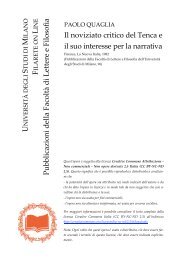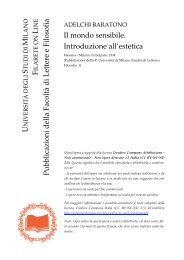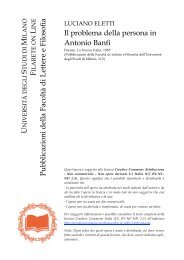Dialoghi sulla religione naturale - Studi umanistici Unimi - Università ...
Dialoghi sulla religione naturale - Studi umanistici Unimi - Università ...
Dialoghi sulla religione naturale - Studi umanistici Unimi - Università ...
You also want an ePaper? Increase the reach of your titles
YUMPU automatically turns print PDFs into web optimized ePapers that Google loves.
226 IL REFERENTE STORICO<br />
porary writers » 8 . L'anonimo autore delle Reflections on various sub-<br />
jects relating to arts and commerce... scriveva nel 1752:<br />
It is a point frequently urged by politicians and divines that thè<br />
Protestant religion is better calculated for trade than thè Catholic...<br />
The great and religious Mr. Boyle gives it as one argument for pro-<br />
pagating thè Gospel in foreign parts, that if thè converts could but<br />
learn so much of Christianity as to go cloathed, it would greatly add<br />
to thè sale of our manufactures. ... As Religion has thus displayed<br />
her goodwill to man, by condescending to some commerciai ends, so<br />
Commerce has, on her part, assisted Religion 9 .<br />
Per la Scozia invece, almeno secondo molti storici contemporanei,<br />
l'ipotesi Weber-Tawney non funziona (è da dire che sia Weber sia Taw-<br />
ney dedicano alla Scozia solo alcuni accenni generici). Non funziona in<br />
nanzitutto per lo stesso John Knox, che scrive: « Wordly tribulations<br />
are thè sign and token of God's love » e dice chiaro che sono i ricchi<br />
a fornire il maggior numero di reprobi all'inferno 10 . Se Weber e Taw-<br />
ney avessero ragione, protesta S. A. Burrell, ci si dovrebbe aspettare<br />
che la Scozia del '600, fanaticamente calvinista, nuotasse nell'oro; in<br />
vece no n . In verità, dice S. G. E. Lythe, il calvinismo almeno sino al<br />
1625 non ebbe alcun effetto positivo sull'economia scozzese 12 . Esso può<br />
aver contribuito a sviluppare le doti morali che formarono la condizione<br />
psicologica dell'abilità commerciale; anche se, come nota D. Daiches, la<br />
credenza nella predestinazione non poteva essere facilmente conciliata<br />
8 T. S. ASHTON, An economie history of England: thè 18 th century, London<br />
1955, p. 19.<br />
9 Cit. in ibidem.<br />
10 Cfr. J. S. McEwEN, The faith of John Knox, London 1961, pp. 92-93.<br />
11 S. A. BURRELL, Calvinism, capitalism and thè middle classes: some after-<br />
thoughts on an olà problem, «The journal of modern history», XXXII (1960),<br />
pp. 134-37. « First of ali, we should expect to find, if these hypotheses are valid,<br />
that seventeenth-century Scotland was a country with a high rate of economie<br />
growth. In thè second piace, it should be plain that Calvinism was a religion pecu-<br />
iiariy associated with thè ' middle class ' and that it was this class which took thè<br />
lead in rebellion. Moreover, we should expect to discover that thè feudal aristocracy<br />
of thè kingdom was opposed to rebellion and to religious ' ideology ' of thè revo-<br />
lutionary class » — scrive Burrell, che smonta poi punto per punto queste tesi.<br />
T. C. SMOUT, A history of thè Scottish people, 1560-1830, cit., pp. 72-100, fa in<br />
vece sua una posizione quasi simmetricamente opposta a quella di Burrell, abbrac<br />
ciando, sia pur con varie ed esplicite riserve, una tesi vicina a quella Weber-Tawney.<br />
12 Cfr. S. G. E. LYTHE, The economy of Scotland in its European setting, 1550-<br />
1625, Edinburgh 1960, p. 78.



